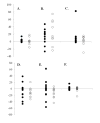The effects of a pre-workout supplement containing caffeine, creatine, and amino acids during three weeks of high-intensity exercise on aerobic and anaerobic performance
- PMID: 20156347
- PMCID: PMC2854104
- DOI: 10.1186/1550-2783-7-10
The effects of a pre-workout supplement containing caffeine, creatine, and amino acids during three weeks of high-intensity exercise on aerobic and anaerobic performance
Abstract
Background: A randomized, single-blinded, placebo-controlled, parallel design study was used to examine the effects of a pre-workout supplement combined with three weeks of high-intensity interval training (HIIT) on aerobic and anaerobic running performance, training volume, and body composition.
Methods: Twenty-four moderately-trained recreational athletes (mean +/- SD age = 21.1 +/- 1.9 yrs; stature = 172.2 +/- 8.7 cm; body mass = 66.2 +/- 11.8 kg, VO2max = 3.21 +/- 0.85 l.min-1, percent body fat = 19.0 +/- 7.1%) were assigned to either the active supplement (GT, n = 13) or placebo (PL, n = 11) group. The active supplement (Game Time(R), Corr-Jensen Laboratories Inc., Aurora, CO) was 18 g of powder, 40 kcals, and consisted of a proprietary blend including whey protein, cordyceps sinensis, creatine, citrulline, ginseng, and caffeine. The PL was also 18 g of powder, 40 kcals, and consisted of only maltodextrin, natural and artificial flavors and colors. Thirty minutes prior to all testing and training sessions, participants consumed their respective supplements mixed with 8-10 oz of water. Both groups participated in a three-week HIIT program three days per week, and testing was conducted before and after the training. Cardiovascular fitness (VO2max) was assessed using open circuit spirometry (Parvo-Medics TrueOne(R) 2400 Metabolic Measurement System, Sandy, UT) during graded exercise tests on a treadmill (Woodway, Pro Series, Waukesha, WI). Also, four high-speed runs to exhaustion were conducted at 110, 105, 100, and 90% of the treadmill velocity recorded during VO2max, and the distances achieved were plotted over the times-to-exhaustion. Linear regression was used to determine the slopes (critical velocity, CV) and y-intercepts (anaerobic running capacity, ARC) of these relationships to assess aerobic and anaerobic performances, respectively. Training volumes were tracked by summing the distances achieved during each training session for each subject. Percent body fat (%BF) and lean body mass (LBM) were assessed with air-displacement plethysmography (BOD POD(R), Life Measurement, Inc., Concord, CA).
Results: Both GT and PL groups demonstrated a significant (p = 0.028) increase in VO2max from pre- to post-training resulting in a 10.3% and 2.9% improvement, respectively. CV increased (p = 0.036) for the GT group by 2.9%, while the PL group did not change (p = 0.256; 1.7% increase). ARC increased for the PL group by 22.9% and for the GT group by 10.6%. Training volume was 11.6% higher for the GT versus PL group (p = 0.041). %BF decreased from 19.3% to 16.1% for the GT group and decreased from 18.0% to 16.8% in the PL group (p = 0.178). LBM increased from 54.2 kg to 55.4 kg (p = 0.035) for the GT group and decreased from 52.9 kg to 52.4 kg in the PL group (p = 0.694).
Conclusion: These results demonstrated improvements in VO2max, CV, and LBM when GT is combined with HIIT. Three weeks of HIIT alone also augmented anaerobic running performance, VO2max and body composition.
Figures




References
-
- Coburn JW, Housh DJ, Housh TJ, Malek MH, Beck TW, Cramer JT, Johnson GO, Donlin PE. Effects of leucine and whey protein supplementation during eight weeks of unilateral resistance training. Journal of strength and conditioning research/National Strength & Conditioning Association. 2006;20(2):284–291. - PubMed
-
- Tipton KD, Rasmussen BB, Miller SL, Wolf SE, Owens-Stovall SK, Petrini BE, Wolfe RR. Timing of amino acid-carbohydrate ingestion alters anabolic response of muscle to resistance exercise. American journal of physiology. 2001;281(2):E197–206. - PubMed
LinkOut - more resources
Full Text Sources
Other Literature Sources
Miscellaneous
